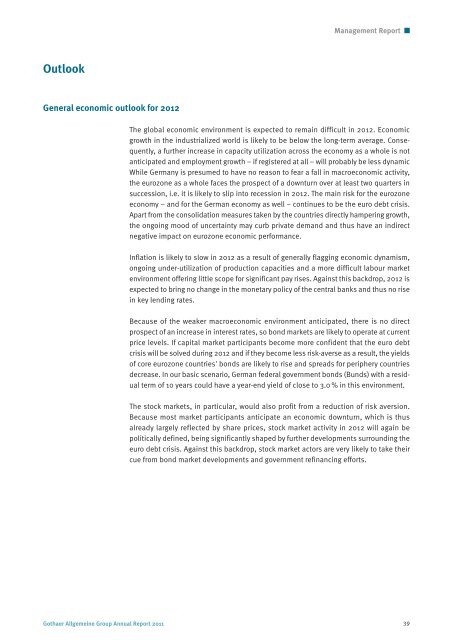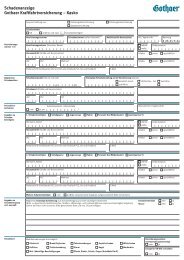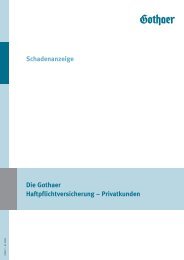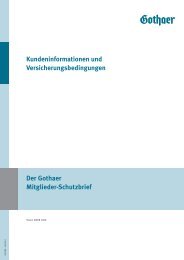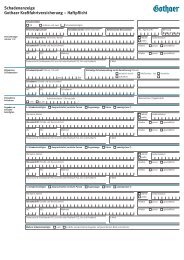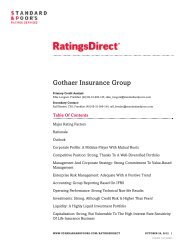Gothaer Allgemeine Versicherung AG Group Annual Report for ...
Gothaer Allgemeine Versicherung AG Group Annual Report for ...
Gothaer Allgemeine Versicherung AG Group Annual Report for ...
Create successful ePaper yourself
Turn your PDF publications into a flip-book with our unique Google optimized e-Paper software.
Management <strong>Report</strong><br />
Outlook<br />
General economic outlook <strong>for</strong> 2012<br />
The global economic environment is expected to remain difficult in 2012. Economic<br />
growth in the industrialized world is likely to be below the long-term average. Consequently,<br />
a further increase in capacity utilization across the economy as a whole is not<br />
anticipated and employment growth – if registered at all – will probably be less dynamic<br />
While Germany is presumed to have no reason to fear a fall in macroeconomic activity,<br />
the eurozone as a whole faces the prospect of a downturn over at least two quarters in<br />
succession, i.e. it is likely to slip into recession in 2012. The main risk <strong>for</strong> the eurozone<br />
economy – and <strong>for</strong> the German economy as well – continues to be the euro debt crisis.<br />
Apart from the consolidation measures taken by the countries directly hampering growth,<br />
the ongoing mood of uncertainty may curb private demand and thus have an indirect<br />
negative impact on eurozone economic per<strong>for</strong>mance.<br />
Inflation is likely to slow in 2012 as a result of generally flagging economic dynamism,<br />
ongoing under-utilization of production capacities and a more difficult labour market<br />
environment offering little scope <strong>for</strong> significant pay rises. Against this backdrop, 2012 is<br />
expected to bring no change in the monetary policy of the central banks and thus no rise<br />
in key lending rates.<br />
Because of the weaker macroeconomic environment anticipated, there is no direct<br />
prospect of an increase in interest rates, so bond markets are likely to operate at current<br />
price levels. If capital market participants become more confident that the euro debt<br />
crisis will be solved during 2012 and if they become less risk-averse as a result, the yields<br />
of core eurozone countries' bonds are likely to rise and spreads <strong>for</strong> periphery countries<br />
decrease. In our basic scenario, German federal government bonds (Bunds) with a residual<br />
term of 10 years could have a year-end yield of close to 3.0 % in this environment.<br />
The stock markets, in particular, would also profit from a reduction of risk aversion.<br />
Because most market participants anticipate an economic downturn, which is thus<br />
already largely reflected by share prices, stock market activity in 2012 will again be<br />
politically defined, being significantly shaped by further developments surrounding the<br />
euro debt crisis. Against this backdrop, stock market actors are very likely to take their<br />
cue from bond market developments and government refinancing ef<strong>for</strong>ts.<br />
<strong>Gothaer</strong> <strong>Allgemeine</strong> <strong>Group</strong> <strong>Annual</strong> <strong>Report</strong> 2011 39


